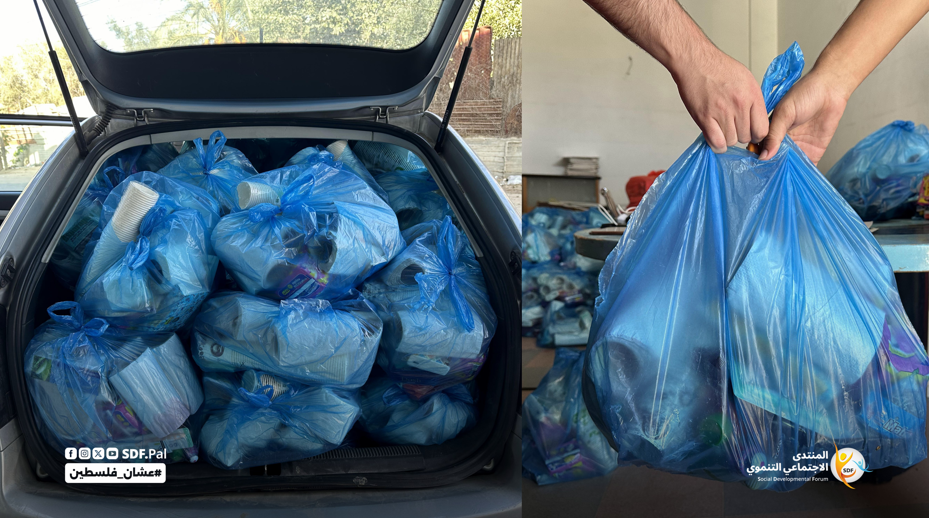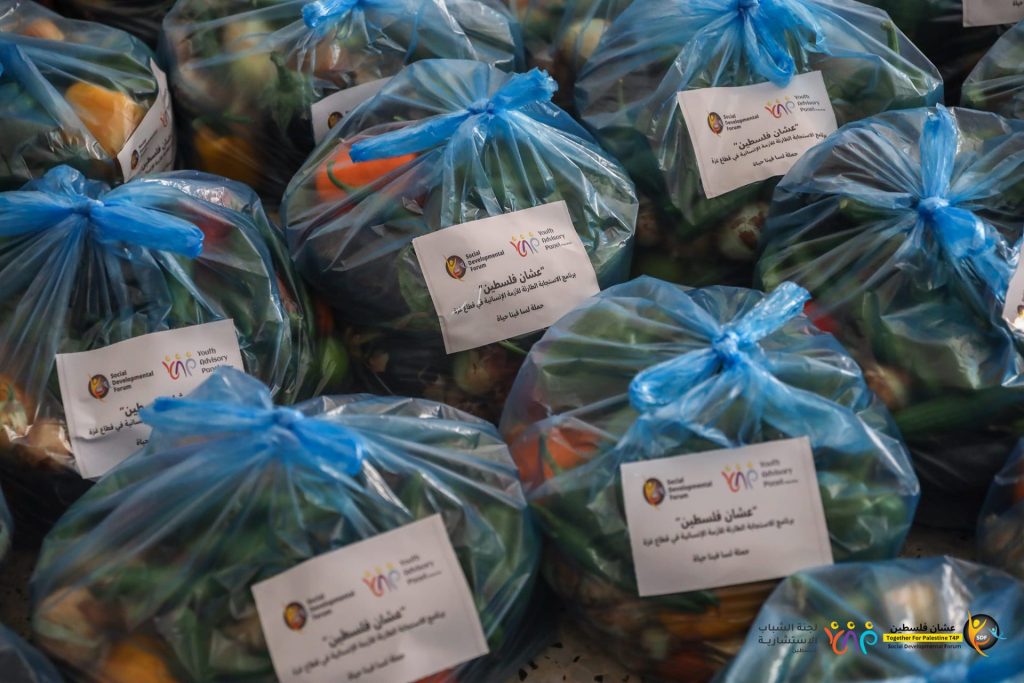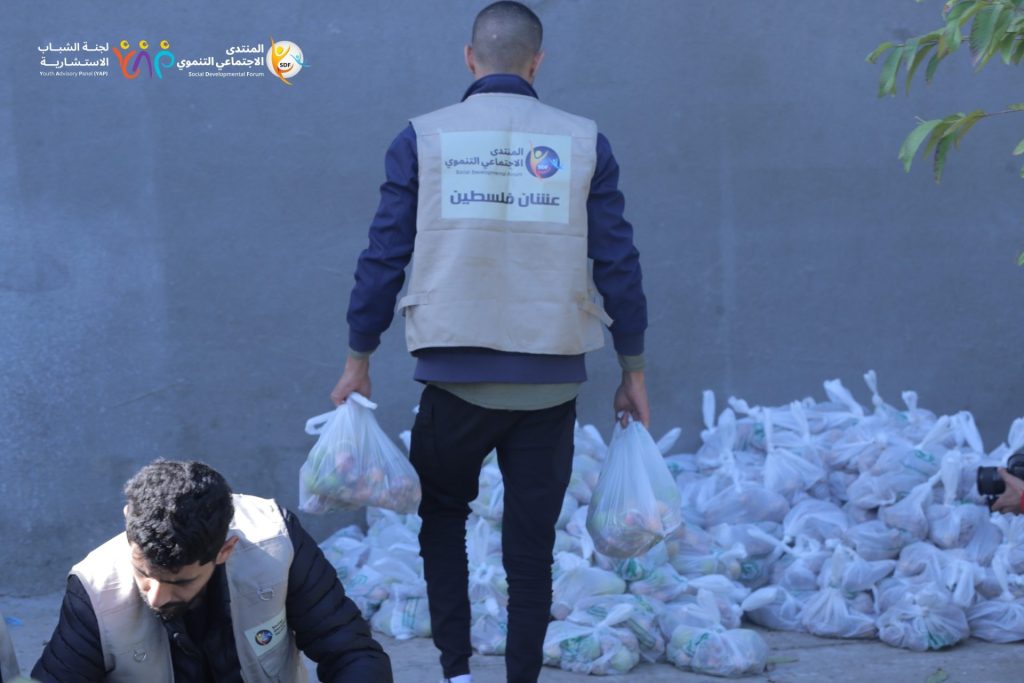SDF Launches an Emergency Response Program to the Humanitarian Crisis in the Gaza Strip

Since the beginning of the Israeli genocide on the Gaza Strip on October 2023, the Social Development Forum (SDF) has been utilizing human, material, and intangible resources to enhance the Gazan community’s emergency resilience amidst the military operations. This includes intensifying advocacy efforts, raising awareness about safety and survival procedures, and safe evacuation during emergencies, especially for people with disabilities, women, and children as well as providing tailored information resources and introducing service referral pathways all over the Gaza Strip.
As the aggression on Gaza is ongoing and the humanitarian crisis worsens across various areas of the sector, a comprehensive and urgent national response became necessary to address the diverse needs of the Palestinian community. This community has suffered from multiple and compounded hardships, including displacement, food and water shortages, lack of medicine, and disrupted communication and transportation channels. In light of this, the Forum launched the “For Palestine” emergency response program aimed at improving the dignified living conditions of displaced Palestinians amidst the Israeli aggression, supporting their resilience, and enhancing emergency response to their basic needs, particularly for children, women, adolescents, and people with disabilities throughout the Gaza Strip.
Why “Together For Palestine“?
The T4P program is a genuine commitment by SDF towards the Gazan community, during these challenging times that urge collective effort and action according to the Palestinian community’s real priorities and needs.
We are urgently acting for more than 500,000 displaced Palestinians in the southern Gaza Strip, living in dire conditions without shelter or resources, necessitating immediate humanitarian interventions amid the catastrophic humanitarian situation affecting all segments of the Gazan community.
Mahmoud Al-Zant, the General Manager of the Social Development Forum (SDF)
With the ongoing Israeli aggression, the needs of displaced and besieged Palestinian families in the most densely populated area in the world are escalating. The disruption of the educational system, alongside the paralysis of the healthcare and social systems, has created a catastrophic situation requiring everyone inside and outside Palestine to extend a helping hand to civilians and the most marginalized groups, as Gaza faces a serious risk of famine according to all UN organizations’ estimates.
Reports by the Ministry of Health and the United Nations Population Fund (UNFPA) indicate that there are 50,000 pregnant women in Gaza, with 180 births expected daily. About one million children (nearly half of Gaza’s population) are either killed, injured, or displaced, while the rest live in one of the most dangerous child development environments in the world, as pointed out by the UNICEF Executive Director.
Together For Palestine; Pathways and Partnerships to Support Palestinian Resilience:
T4P is designed to address the immediate needs of children, women, people with disabilities, and the displaced throughout Gaza, contributing to the resilience and empowerment of Gaza’s citizens. Believing in the power of partnerships for the success of our program, we work in collaboration with a range of international and local partner organizations, including the United Nations Population Fund, the Youth Advisory Panel (YAP), UNICEF, the Medical Aid For Palestinians (MAP), the General Union of Persons with Disability, and a wide array of local organizations. We are expanding our partnership network and deepening collective action to face the severe humanitarian situation in Gaza. Thus, the program’s interventions span five main pathways:
1.5. Primary Psychological First Aid:
As part of the emergency intervention strategy to help citizens relieve stress, enhance resilience, and develop coping strategies for the complex security and psychological realities they have faced since the beginning of the aggression, SDF’s Youth Network volunteers implement primary psychological first aid activities for displaced children, women, and adolescents in various locations in southern Gaza, both inside and outside displacement centers.

2.5. Provision of Hygiene and Personal Care Supplies:
Providing a range of general and personal hygiene supplies to citizens in shelters and beyond, crucial for maintaining public health and hindering the spread of diseases, especially given the decline in public services provided to families, particularly women, adolescents, and people with disabilities across Gaza.

3.5. Clothing and Basic Needs:
1.5 million citizens in Gaza have been forcibly displaced and unable to retain any of their belongings. T4P assists children, adolescents, and women in obtaining personal clothing items, especially with the onset of winter making this need a top priority for all families.

4.5. Flexible Humanitarian Interventions:
Based on daily monitoring of displaced people’s needs in various areas, emergency teams plan and implement tailored humanitarian relief interventions inside and outside displacement centers. These initiatives include providing essential living supplies such as mattresses, blankets, baby formula, special needs of the elderly and disabled, non-food items, and cooking utensils.

5.5. Coordination and Referral:
In parallel with previous interventions, the response teams coordinate with other humanitarian actors to refer citizens to obtain services from mandated providers. This process involves close cooperation with our partners and humanitarian organizations operating in Gaza, enabling our teams to connect, coordinate, and guide women and people with disabilities to entities providing specific services like specialized aids, healthcare services, and food provision.
The program has been designed to target all provinces of the Gaza Strip, with an extensive network of operations in various areas, working in collaboration with local and international partners committed to improving the lives of Palestinians.

